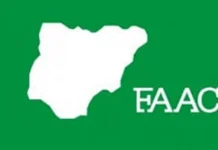Following the failure to resolve the endemic Apapa traffic gridlock after several attempts, the Nigerian Ports Authority (NPA) has called on the federal government to declare a state of emergency to resolve the situation.
This is just as it dismissed insinuations that the traffic congestion in Apapa is the result of lack of capacity of terminals at the ports to receive the volume of cargo that comes into the country, stating that things have gotten worse in the area since 2017 when the country received the lowest volume of cargo in recent times.
Speaking to newspaper editors in Lagos Saturday, Managing Director of NPA, Hadiza Bala-Usman explained that with the current state of the roads, priority must be given to every process that would lead to an improvement in access roads into the ports.
According to her, “If we have identified the Port Access Road in Apapa and Oshodi all the way to the toll gate as bad portions and we realise how much they affect access to the ports, businesses and residents around the Apapa area and ultimately the economy of the nation, it means that we must give emergency attention to every process involved.
“This includes priority for approvals across board, priority consideration for budget provision and priority for listing at the Federal Executive Council. I am happy that the situation has drawn attention at the highest level such that the Vice President, Professor Yemi Osinbajo, has had to visit Apapa twice in the past one week. I am confident that something positive will happen this time.
“At the peak of cargo reception in 2014 Cargo throughput was put at 84,951,927 MT, we did not have the type of congestion that we had in 2017 when we only did 71, 776, 545MT. This is to show you that the volume of cargo is not the reason why we have this situation.”
She explained that aside from the dilapidated and parlous state of the roads, the country has also not improved infrastructure in the port area in the past ten years.
“There is also the very important need of deploying intermodal means of transportation around the ports. There is no way you can move 90 percent of cargo coming into the country by road and expect the required level of efficiency. This is because more than the attendant traffic congestion, you will also see that the roads cannot be durable because of the heavy tonnage of the trucks.
“The only sustainable way for effective cargo evacuation is therefore the use of roads, rails and water to move cargo into the hinterland, And we doing our best to facilitate the efforts of companies who are interested in moving cargo through barges. One of these is Connect Rail, which operates between Tin Can and Ikorodu. We are also working with the Nigerian Railway Corporation to see more effective use of rail in the movement of cargo with hope that the concessioning of railways which the Ministry of Transport is working on will bring a more permanent solution.” Bala Usman said.
In the interim however, she noted that shipping companies must comply with the utlilisation of holding bays even as the authority and the Lagos State government are working towards ensuring that a sufficient number of trailer parks are licenced as a way of taking articulated vehicles off the roads.
She said further the NPA, which recently sanction four shipping companies will continue to monitor the situation and apply the necessary sanctions needed to make all companies comply.
She explained that this administration is working assiduously towards ensuring that traffic increases in the Eastern Ports comprising Warri, Onne, Port Harcourt and Calabar.
While stating further that the nature of the maritime industry is to allow cargo owners determine the port of call, she said that the FEC recently gave approval for the contract to dredge the Warri/Escravos Channel which would increase the draught of Warri, while proposals for the dredging of Calabar is also being discussed currently.
“we have been speaking with shipping companies to deploy flat bottom vessels that require lower draught levels pending the completion of the dredging efforts. Two of such vessels called at Calabar last year and it was in the news two weeks ago that the Calabar ports generated about N3bn in the first three months of this year. So we are determined to get all our ports working, “she said.
She explained that the final destination of a lot of the cargo that come into the Lagos ports are within the Lagos/Ogun State industrial cluster, which is the reason we just have to prepare all our ports to function at utmost capacity.












